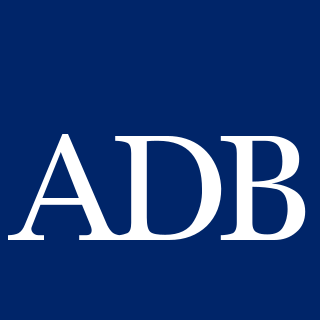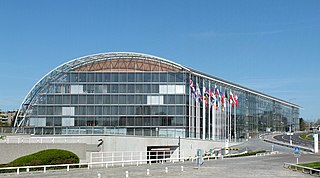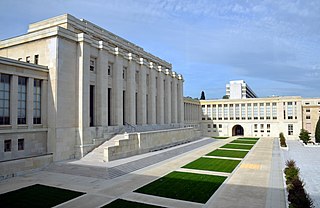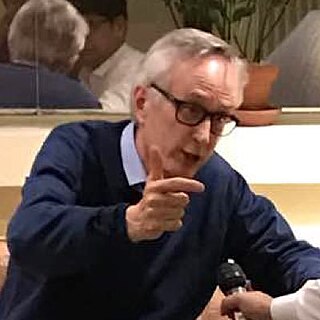Related Research Articles

Extreme poverty, deep poverty, abject poverty, absolute poverty, destitution, or penury, is the most severe type of poverty, defined by the United Nations (UN) as "a condition characterized by severe deprivation of basic human needs, including food, safe drinking water, sanitation facilities, health, shelter, education and information. It depends not only on income but also on access to services". Historically, other definitions have been proposed within the United Nations.

The Asian Development Bank (ADB) is a regional development bank established on 19 December 1966, which is headquartered in the Ortigas Center located in the city of Mandaluyong, Metro Manila, Philippines. The company also maintains 31 field offices around the world to promote social and economic development in Asia. The bank admits the members of the United Nations Economic and Social Commission for Asia and the Pacific and non-regional developed countries. From 31 members at its establishment, ADB now has 68 members.
The economy of Liberia is extremely underdeveloped, largely due to the First Liberian Civil War (1989–1996). Liberia itself is one of the poorest and least developed countries in the world.

Sustainable development is an organizing principle for meeting human development goals while also sustaining the ability of natural systems to provide the natural resources and ecosystem services on which the economy and society depend. The desired result is a state of society where living conditions and resources are used to continue to meet human needs without undermining the integrity and stability of the natural system. Sustainable development can be defined as development that meets the needs of the present generation without compromising the ability of future generations to meet their own needs.

The United Nations Economic and Social Council is one of the six principal organs of the United Nations, responsible for coordinating the economic and social fields of the organization, specifically in regards to the fifteen specialised agencies, the eight functional commissions, and the five regional commissions under its jurisdiction.

The United Nations Conference on Trade and Development (UNCTAD) was established in 1964 as an intergovernmental organization intended to promote the interests of developing states in world trade.

The International Bank for Reconstruction and Development (IBRD) is an international financial institution, established in 1944 and headquartered in Washington, D.C., United States, that is the lending arm of World Bank Group. The IBRD offers loans to middle-income developing countries. The IBRD is the first of five member institutions that compose the World Bank Group. The initial mission of the IBRD in 1944, was to finance the reconstruction of European nations devastated by World War II. The IBRD and its concessional lending arm, the International Development Association (IDA), are collectively known as the World Bank as they share the same leadership and staff.

The World Bank Group (WBG) is a family of five international organizations that make leveraged loans to developing countries. It is the largest and best-known development bank in the world and an observer at the United Nations Development Group. The bank is headquartered in Washington, D.C. in the United States. It provided around $98.83 billion in loans and assistance to "developing" and transition countries in the 2021 fiscal year. The bank's stated mission is to achieve the twin goals of ending extreme poverty and building shared prosperity. Total lending as of 2015 for the last 10 years through Development Policy Financing was approximately $117 billion. Its five organizations are the International Bank for Reconstruction and Development (IBRD), the International Development Association (IDA), the International Finance Corporation (IFC), the Multilateral Investment Guarantee Agency (MIGA) and the International Centre for Settlement of Investment Disputes (ICSID). The first two are sometimes collectively referred to as the World Bank.

The European Investment Bank (EIB) is the European Union's investment bank and is owned by the EU Member States. It is one of the largest supranational lenders in the world. The EIB is a not-for-profit organisation which funds projects that achieve the policy aims of the European Union through loans, guarantees and technical assistance.
Global Affairs Canada is the department of the Government of Canada that manages Canada's diplomatic and consular relations, promotes Canadian international trade, and leads Canada's international development and humanitarian assistance. It is also responsible for maintaining Canadian government offices abroad with diplomatic and consular status on behalf of all government departments.
Walter Lockhart Gordon was a Canadian accountant, businessman, politician, and writer.

Lester B. Pearson International Airport, commonly known as Toronto Pearson International Airport, is an international airport located in Mississauga, Ontario, Canada. It is the main airport serving Toronto, its metropolitan area, and the surrounding region known as the Golden Horseshoe. It handled 50.5 million passengers in 2019. The airport is named in honour of Lester B. Pearson, who served as the 14th prime minister of Canada and received the Nobel Peace Prize in 1957.

The United Nations Office at Geneva in Geneva, Switzerland, is one of the four major offices of the United Nations where numerous different UN agencies have a joint presence. The main UNOG administrative offices are located inside the Palais des Nations complex, which was originally constructed for the League of Nations between 1929 and 1938.

The International Work Group for Indigenous Affairs (IWGIA) is an independent and non-profit international human rights-based membership organization, whose central charter is to endorse and promote the collective rights of the world's indigenous peoples. Established in 1968, the IWGIA is registered as a non-profit organization in Denmark, with the head office of its secretariat based in Copenhagen. IWGIA's work is primarily funded by the Nordic Ministries of Foreign Affairs and the European Union.

Lester Bowles "Mike" Pearson was a Canadian scholar, statesman, diplomat, and politician who served as the 14th prime minister of Canada from 1963 to 1968.

Sir Michael Blaydon Barber is a British educationist, author and global expert on implementation of large-scale system change, education systems and education reform, and was knighted in 2005 for his contributions to improving government. He is the founder and chairman of Delivery Associates, a global advisory firm focussed on working with governments and other public and social impact organisations to help deliver improved outcomes for people around the world.

Kristalina Ivanova Georgieva-Kinova is a Bulgarian economist serving as chair and managing director of the International Monetary Fund since 2019. She was the Chief Executive of the World Bank Group from 2017 to 2019 and served as Acting President of the World Bank Group from 1 February 2019 to 8 April 2019 following the resignation of Jim Yong Kim. She previously served as Vice-President of the European Commission under Jean-Claude Juncker from 2014 to 2016.
Gender and development is an interdisciplinary field of research and applied study that implements a feminist approach to understanding and addressing the disparate impact that economic development and globalization have on people based upon their location, gender, class background, and other socio-political identities. A strictly economic approach to development views a country's development in quantitative terms such as job creation, inflation control, and high employment – all of which aim to improve the ‘economic wellbeing’ of a country and the subsequent quality of life for its people. In terms of economic development, quality of life is defined as access to necessary rights and resources including but not limited to quality education, medical facilities, affordable housing, clean environments, and low crime rate. Gender and development considers many of these same factors; however, gender and development emphasizes efforts towards understanding how multifaceted these issues are in the entangled context of culture, government, and globalization. Accounting for this need, gender and development implements ethnographic research, research that studies a specific culture or group of people by physically immersing the researcher into the environment and daily routine of those being studied, in order to comprehensively understand how development policy and practices affect the everyday life of targeted groups or areas.

The World Bank is an international financial institution that provides loans and grants to the governments of low- and middle-income countries for the purpose of pursuing capital projects. The World Bank is the collective name for the International Bank for Reconstruction and Development (IBRD), International Finance Corporation and International Development Association (IDA), three of five international organizations owned by the World Bank Group. It was established along with the International Monetary Fund at the 1944 Bretton Woods Conference. After a slow start, its first loan was to France in 1947. In the 1970s, it focused on loans to developing world countries, shifting away from that mission in the 1980s. For the last 30 years, it has included NGOs and environmental groups in its loan portfolio. Its loan strategy is influenced by the Millennium Development Goals as well as environmental and social safeguards.